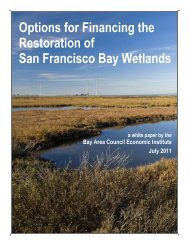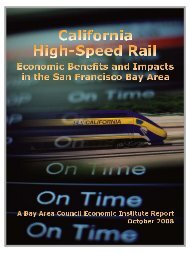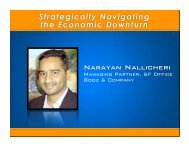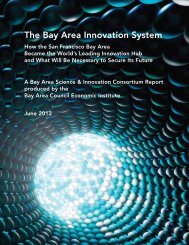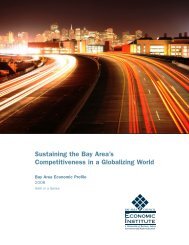Ties That Bind - Bay Area Council Economic Institute
Ties That Bind - Bay Area Council Economic Institute
Ties That Bind - Bay Area Council Economic Institute
Create successful ePaper yourself
Turn your PDF publications into a flip-book with our unique Google optimized e-Paper software.
<strong>Bay</strong> <strong>Area</strong>-China Trade: Behind the Numbers<br />
when defendants refused to pay. As mentioned earlier, the arbitration venue is negotiated and<br />
specified in commercial contracts between parties, and is a function of bargaining leverage. Many<br />
attorneys advise clients to refuse any China arbitration or, failing that, to require that the arbitration<br />
panel chair be a third country national. Use of local arbitration panels requires due diligence<br />
and venue shopping. Cedric Chao, an attorney with Morrison & Foerster in San Francisco who<br />
is licensed to sit on CIETAC arbitration panels, says international arbitration is still the fairest<br />
dispute settlement option for foreign companies.<br />
Intellectual property cases are the exception, Chao says, and are typically heard in court for two<br />
reasons: IP cases can be highly technical and if the arbitration panel gets it wrong there is no appeal<br />
provision, whereas a court ruling can be appealed; and the absence of juries and punitive<br />
damages in Chinese courts moderates potential awards. Courts can also grant immediate injunctive<br />
relief to plaintiffs, halting the activities of counterfeiting operations. The downside is that a<br />
civil court case is a more public process than arbitration, and a case involving foreign and Chinese<br />
litigants—particularly one centering on intellectual property protection—may be more likely<br />
to attract press coverage.<br />
Courts may be gradually gaining in favor among attorneys. A compulsory national exam for<br />
judges, prosecutors and lawyers has helped professionalize the courts. In addition, commercial<br />
cases pitting foreign versus Chinese litigants often attract publicity and cause judges to exercise<br />
greater caution in hearing those cases—to the point that Chinese companies have complained at<br />
times that they cannot get a fair hearing.<br />
An estimated 100 foreign law firms operate in China. The licensing process is less than transparent,<br />
involving extensive documentation and approval delays. Attorneys are barred from identifying<br />
themselves as such and practicing in China while license applications are pending, but a<br />
number reportedly operate unofficially out of hotels without business cards.<br />
%D\ $UHD &RQQH�WLRQV<br />
<strong>Bay</strong> <strong>Area</strong> lawyers, judges and legal scholars have been active in China since the early 1980s, participating<br />
in exchanges and directly advising China’s government and its courts, including the<br />
Supreme People’s Court, on legal reform. Many of these exchanges were initiated through UC<br />
Berkeley’s Boalt Hall School of Law and through the San Francisco-Shanghai Sister City<br />
Committee, chaired by San Francisco attorney and city supervisor Gordon Lau. As already<br />
noted, for many years the Asia Foundation has played a major international role supporting legal<br />
development in China.<br />
Leading <strong>Bay</strong> <strong>Area</strong> Law Firms Active in China<br />
Allbright Law Offices<br />
Baker & McKenzie<br />
Cooley Godward<br />
DLA Piper Rudnick Gray Cary<br />
Heller Ehrman<br />
69



